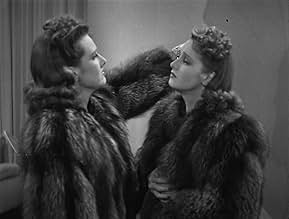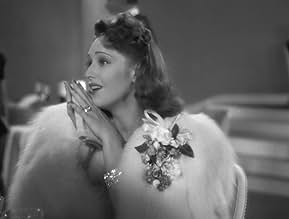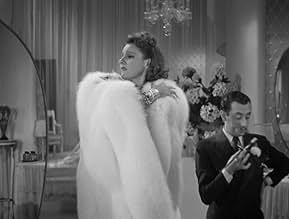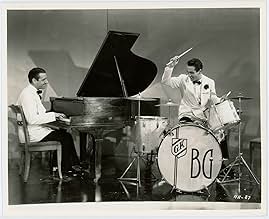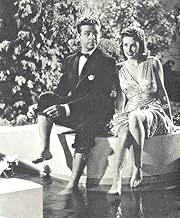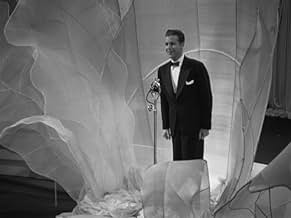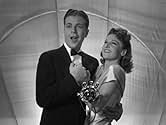Ronny Bowers consigue un contrato discográfico pero es despedido tras negarse a acompañar a la cantante Mona Marshall. Encuentra trabajo como cantante mesero y es redescubierto, se le pide q... Leer todoRonny Bowers consigue un contrato discográfico pero es despedido tras negarse a acompañar a la cantante Mona Marshall. Encuentra trabajo como cantante mesero y es redescubierto, se le pide que doble a un actor, pero surgen complicacionesRonny Bowers consigue un contrato discográfico pero es despedido tras negarse a acompañar a la cantante Mona Marshall. Encuentra trabajo como cantante mesero y es redescubierto, se le pide que doble a un actor, pero surgen complicaciones
- Premios
- 1 premio ganado en total
Argumento
¿Sabías que…?
- TriviaThe actual "Hollywood Hotel" on which this movie is based, was a Hollywood institution, attracting the likes of Mary Pickford and Douglas Fairbanks to Thursday night dances. It was a sprawling building built at the turn of the century at 6811 Hollywood Blvd. and had formal gardens, grand lobby, two towers and a ballroom. It was the hangout for many stars over the years. It was finally torn down in 1956. The site is now occupied by the new Hollywood-Highland shopping complex and Dolby Theatre, where the Oscars are now presented every year. The film includes shots of the exterior of the hotel, which was no longer prominent at the time of the film.
- ErroresIn the credits, Dick Powell's character is spelled: Ronnie Bowers. But, at the beginning of the film, during the character's "Hooray for Hollywood" send off from St. Louis, banners in the crowd spell his name: Ronny.
- Citas
Dress Designer: [referring to her gown] If your fans don't explode when you walk into that premiere tonight, I'll tear it to pieces!
Mona Marshall: Do you really think so, Butch?
- ConexionesEdited into The Shining Future (1944)
- Bandas sonorasHooray for Hollywood
(1937) (uncredited)
Music by Richard A. Whiting (as Dick Whiting)
Lyrics by Johnny Mercer
Sung by Johnnie Davis and Frances Langford
Performed by Benny Goodman and His Orchestra
The plot revolves around Ronnie Bowers (Dick Powell), a saxophone player in Benny Goodman's band, winning a talent contest and a ten-week trip to Hollywood, leaving behind band vocalist and teary-eyed girlfriend, Alice Crane (Frances Langford) at the St. Louis Airport. After arriving in Hollywood, Ronnie is escorted by Bertie Walton (Allyn Joslyn), a studio press agent for All-Star Pictures, and Joe (Eddie Acuff), a photographer, to the Hollywood Hotel. The story then shifts over to Mona Marshall (Lola Lane), a temperamental movie star sharing the room with her wacky kid sister (Mabel Todd), her even more bewildered father, Chester (Hugh Herbert), and personal secretary, Jonesy (Glenda Farrell). Because another glamor girl was offered a part she wanted, Mona leaves Hollywood. With Mona's new film, GLAMOUR GIRL, opening that evening, Walton hires waitress, Virginia Stanton (Rosemary Lane), to impersonate her, having Ronnie accompany her to the premiere. When Mona finds she's been misrepresented in public, she arranges for both Virginia and Ronnie to be fired. With Fuzzy (Ted Healy), as his new press agent, Ronnie obtains work at Callahan's (Edgar Kennedy) drive-in eatery before being discovered by director Walter Kelton (William B. Davidson) of All-Star Pictures. Much to Ronnie's surprise, rather than an acting job, he's to have his singing voice dubbed in for Alexander DuPre (Alan Mowbray), Mona's hammy co-star for an upcoming production, LOVE AND GLORY.
Fine tunes in the Hollywood Hotel musical program include: "Hooray for Hollywood" (performed by Benny Goodman's Band, sung by Johnnie Davis, Frances Langford, cast); "I'm Like a Fish Out of Water" (sung by Dick Powell and Rosemary Lane); "Silhouetted in the Moonlight" (sung by Rosemary Lane at the Hollywood Bowl); "Let That Be a Lesson to You" (introduced by Johnnie Davis and played by Benny Goodman's Band, sung by Dick Powell, Rosemary Lane, Ted Healy, Mabel Todd, and drive-in patrons at Callahan's Eats, with occasional interruptions by the nervous Edgar Kennedy); Benny Goodman Band instrumental medley: "Sing, Sing, Sing" and "I've Got a Heartful of Music," "I Hitched My Wagon to a Star" (sung by Alan Mowbray, voice dubbing by Powell); "Silhouetted in the Moonlight" (sung by Jerry Cooper and Frances Langford); "Dark Eyes" (O Tchonia) A Russian folk song performed instrumentally by Raymond Paige and his Orchestra, participated by chorus humming the score; "I Hitched My Wagon to a Star" (sung by Powell); "Sing You Son-of-a-Gun" (sung by Powell and Rosemary Lane) and "Hooray for Hollywood" (sung by Johnnie Davis and cast).
Of the handful of songs heard, especially during the Orchard Room sequence, its only low-point is Jerry Cooper's rendition to "Silhouetted in the Moonlight," opposite Frances Langford. A Langford solo or duet with Powell would have been sufficient. In the motion picture soundtrack to Hollywood HOTEL, compliments of Hollywood Soundstage (1981), the record not only includes the entire musical segments, but outtakes featuring the complete version to "Silhouetted in the Moonlight" which, after Rosemary Lane's solo, existing in the final print, is joined in by the singing Powell with a duet conclusion. Another cut is Benny Goodman's Band playing to "I Got a Heart Full of Music" and "House Hop," portions that were used in the musical short, FOR AULD LANG SYNE (1938), a tribute to Will Rogers.
Hollywood HOTEL, under Busby Berkeley's supervision as director, is a musical of lavish scale, with none of his trademarks of surrealistic choreography for which he is famous. There's plenty of singing but no dancing, coming off like a 1940s musical, especially during the Benny Goodman's Band interludes consisting of future legends as Lionel Hampton, Harry James (on the clarinet), and Gene Krupa (drummer) performing. Ronald Reagan, another soon-to-be lead actor and future U.S. President is seen briefly as a radio announcer during the premiere of LOVE AND GLORY.
Hollywood HOTEL is a far cry from being the best of the Warner Brothers musical cycle, but in many ways it's a nostalgic look to its bygone golden age, giving a glimpse of makeup artist, Perc Westmore, appearing as himself, glamorizing the ordinary waitress Rosemary Lane into movie star quality. With the exception near the conclusion of the story, Rosemary hardly shares any scenes with her older but look-alike sister, Lola.
Interestingly, the one thing missing in Hollywood HOTEL which was common place in films about Hollywood on Hollywood is the use of major stars doing surprise guest bits. Imagine Dick Powell's Ronnie Bowers entering the Hollywood Hotel and coming across briefly such big named actors as Bette Davis, Pat O'Brien, Humphrey Bogart, or even the use of some inside humor in having him meeting up with Joan Blondell (Powell's off- screen wife). Instead, it uses radio announcers, Ken Niles and Duane Thompson, and newspaper columnist, Louella Parsons, appearing as themselves. Parsons, who was then a noted personality, is a far cry from being a natural performer.
As a spoof, Hollywood HOTEL purposely finds the temperamental Lola Lane overacting all over the place; Hugh Herbert "woo-wooing" in and out of scenes; and in a movie within a movie, the premiere of LOVE AND GLORY, a Civil War story, is noticeably a disguised version to Margaret Mitchell's then best selling novel "Gone With the Wind," with the central character called Captain Cutler (in place of Rhett Butler). Quite lengthy at 109 minutes, it's worthy screen entertainment. Look for it next time it plays on Turner Classic Movies. (***)
- lugonian
- 31 jul 2003
- Enlace permanente
Selecciones populares
- How long is Hollywood Hotel?Con tecnología de Alexa
Detalles
- Fecha de lanzamiento
- País de origen
- Idioma
- También se conoce como
- Отель 'Голливуд'
- Locaciones de filmación
- Glendale Grand Central Air Terminal - Grandview Avenue, Glendale, California, Estados Unidos(Ronnie's flight arrives in California)
- Productoras
- Ver más créditos de la compañía en IMDbPro
- Tiempo de ejecución1 hora 49 minutos
- Color
- Mezcla de sonido
- Relación de aspecto
- 1.37 : 1
Contribuir a esta página


